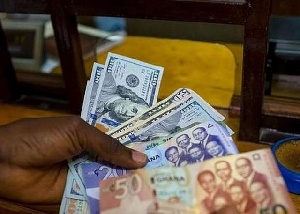- Home - News
- Elections 2024
- News Archive
- Crime & Punishment
- Politics
- Regional
- Editorial
- Health
- Ghanaians Abroad
- Tabloid
- Africa
- Religion
- Photo Archives
- Press Release
General News of Tuesday, 6 May 2025
Source: www.ghanawebbers.com
Cedi’s streaking stability, a cocktail of confidence or just calm before the storm? – Emmanuel Oppong writes
The Ghana cedi is making a surprising comeback. Known for its volatility, it is now holding steady against the dollar. This stability is noteworthy in a time when economic signs are crucial.
Since December 2024, the cedi has shown one of its longest periods of stability. Some days, it even appreciated against the US dollar. Just months ago, this seemed unlikely.
As of May 5, 2025, commercial banks quoted the dollar at GH¢13.98. Forex bureaus sold it slightly higher at around GH¢14.40. The Bank of Ghana reported a 2.76% appreciation of the cedi against the dollar from January to April 2025.
Analysts believe this resilience is not accidental. It results from deliberate monetary policies and active liquidity support from the Bank of Ghana. The central bank’s Gold Purchase Programme has also boosted market confidence and reduced speculation.
The International Monetary Fund (IMF) praised Ghana for its strong reserve buildup. By February 2025, gross international reserves reached $9.3 billion, exceeding IMF targets under its Extended Credit Facility (ECF). A recent Staff Level Agreement with the IMF has further increased investor confidence in Ghana's economy.
Global observers have taken notice as well. The World Bank’s April 2025 report noted that the cedi only depreciated by 4% in early 2025—a solid performance compared to previous years. Forbes ranked the cedi as Africa’s seventh strongest currency by Q1 2025.
On paper, signs look promising. Inflation is slowing down; March 2025 saw a year-on-year rate of 22.4%. This is an improvement from much higher levels in late 2023 and early 2024.
However, many Ghanaians wonder if this stability eases their daily struggles. Market prices remain high, transport fares are still elevated, and small businesses face tight profit margins.
Looking ahead, the government plans to establish Goldbod—a national gold-backed initiative to strengthen the cedi further. This aims to leverage Ghana’s gold resources to reduce foreign exchange reliance and enhance reserves.
Dr. Johnson Asiama, the new Governor of the Bank of Ghana, expresses optimism about future stability. He believes that while allowing the cedi to float is essential, excessive volatility should be over.
This statement reflects confidence in current policies but poses a challenge: ensuring macroeconomic calm translates into microeconomic comfort for citizens.
For now, Ghana's cedi enjoys unexpected stability. Whether this leads to lasting economic relief depends on consistent policy and fiscal discipline—along with how benefits reach everyday Ghanaians.
Stability must translate into predictable markets and affordable living costs for all citizens.











